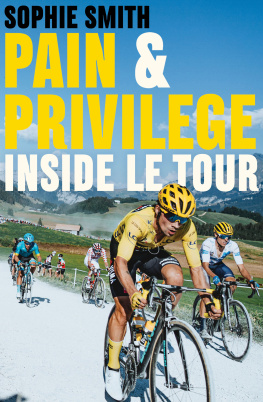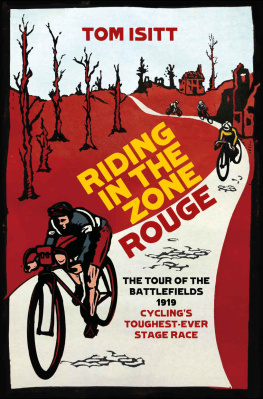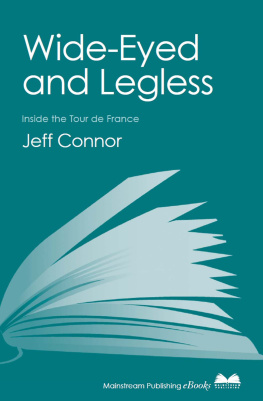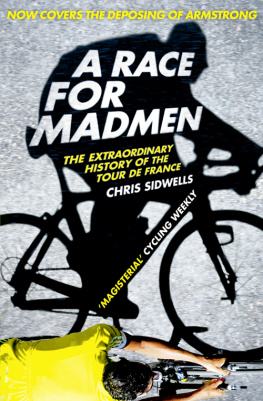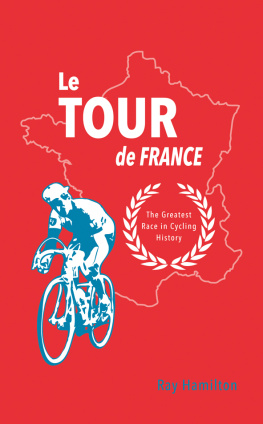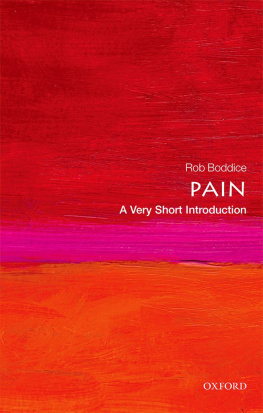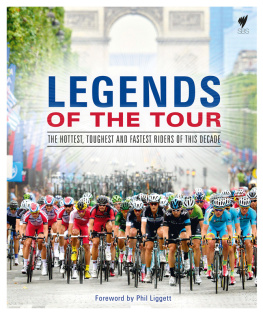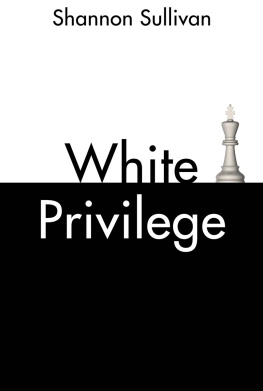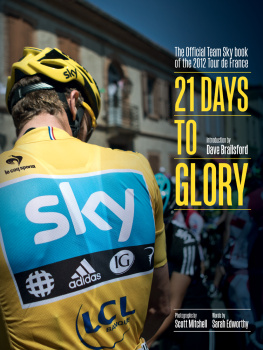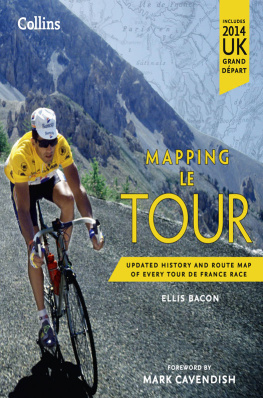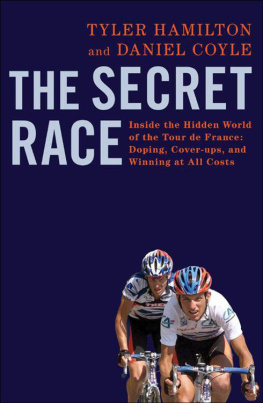
A t my first Tour de France, the sensory overload was so great that I felt like I was either drunk or hungover at the beginning.
Seventeen days before the beginning of the 2012 edition Id packed my bags and moved from Australia to England to work at Cycling Weekly and Cycle Sport magazines.
When I landed in the UK, I knew maybe three or four people: the deputy editor, Simon Richardson, who offered me the job, and some colleagues who Id met on the circuit in the Middle East before.
It was the summer, and I finally had the opportunity to report from the biggest annual sporting contest in the world, the Tour, and major cycling races across the UK, Europe, Asia and America.
Id barely unpacked my suitcase before I had to repack it and leave for the continent, the Tour already underway. I arrived on either the first or second rest day. I cant remember which.
It had been raining incessantly in England but there wasnt a cloud in the sky in France and, walking across the tarmac, Id closed my eyes momentarily to soak in the sun.
Later at a Team Sky press conference the British squad, which would go on to win the first of many yellow jerseys the same sun started to feel too intense. The media op with international press was hosted outside the squads hotel and the only shade around was that shielding the riders perched behind a long rectangular table.
After the formal proceedings, everyone dispersed back into the hotel to do more informal interviews. Inside I found Australian cyclist Michael Rogers, who was riding for Sky at the time.
I sat next to him and fired away some questions about the race. I was meant to then move on and find someone else to talk to but instead I just sat there. I dont know if it was the effect of the sun or hearing another Australian accent or both, but I couldnt move.
Sacrificing the comforts of home to move to Europe and try to make something of yourself is an experience every Australian rider has had. And being so far away, sometimes you do feel isolated. Its not like after a bad couple of days you can pop back to see family or friends. It takes a weekend just to get home.
Rogers seemed to identify what was going on before I did. He started to tell me about his experiences when he moved to Italy as a rookie racer, not speaking a word of Italian and also knowing few people. It was rough. At least in the UK I could understand everyone, and they could understand me. For the most part.
It would get better, Rogers told me. And he was right. When my UK visa expired in 2014, I initially didnt want to go back to Australia. There are riders who stay abroad after their racing careers have finished.
I had no expectations of what the Tour would be like because, unlike many, I didnt grow up watching it. One of my earliest memories is learning how to ride a bike and as a kid I cycled regularly to and from school and on weekends with my family. But I never thought about cycling as a professional sport until, as a rookie journalist working at the Geelong Advertiser in 2009, I was told cycling was going to be my new beat.
In 2010, I reported on the UCI Road World Championships, an annual event, which that year took place in Geelong and Melbourne, and ultimately became a springboard for my career.
I had watched the Tour only twice on TV before I became a part of it.
Once there I initially felt dazed, and the race was quite confronting, but over time, and with experience, I learned all the different unwritten rules journalists and riders are expected to abide by, and made friends, some of whom I now count among my best.
I am so focused while I am reporting during the Tour that, immediately after and before stages, I sometimes go into autopilot. While most international sports impose order and distance between athletes, journalists and fans, the Tour scene, before the onset of the COVID-19 pandemic, was often akin to the Wild West. Someone can be in my face saying hello and, unless it relates to whatever story or angle I am fixated on, I dont always register that they are even there.
The people who comprise the Tour cyclists, team management and staff, media, officials and organisers will often describe their general experience at the race as unparalleled stress, despite the inspiring stories that are written and broadcast. Its true the Tour takes it out of you in a way other events on the cycling calendar do not. Everyone begins the Tour looking sprightly but, even after a few days, appearances change. The crease marks of sleep deepen in peoples cheeks, styled hairdos become unkempt, eyes start to droop and turn bloodshot.
If you stay in the race from the first stage to the last, you dont notice these changes until the end, but if you come in and out you do.
I admire colleagues who wake at 6 am or earlier to get a bit of exercise in before stages. Towards the end I am sleeping in as late as possible and nicking hotel coffee cups because I desperately need the caffeine hit but dont have enough time to sit in the restaurant.
And yet there is something about the Tour. The more you commit to it, the more it takes from you, but its very addictive.
Usually, the Tour transcends global politics. Its a melting pot of cultures that offers an escape from the real world. The Tour changed dramatically in the first two years of the COVID-19 pandemic. In 2020 it was postponed from its usual JuneJuly time slot to AugustSeptember, when people were still fearful of coronavirus, not fed up with lockdowns. I stayed in Australia that year and in the lead-up to the delayed race, which was by all accounts a smaller and quieter moving circus, wrote a column for La Course En Tte, questioning if it was responsible to move forward with it in the global climate. Not everyone agreed with that viewpoint.
In 2021, Australia had closed itself off from the rest of the world and strongly discouraged its citizens from leaving, but after a long, expensive, and mostly maddening process I got government permission to exit the country on business. The Tour had returned to its usual time slot but wasnt at all what I knew. The TV compound normally full of hundreds of broadcast trucks was about a quarter of the size. So too was the press room. Face masks were required everywhere and, notably, journalists were segregated from teams by fences that ensured social distancing. Instead of bumping shoulders in the teams paddock, you were confined to a designated area near the stage start or finish, shouting at a rider or sports director at a distance to stop. When, or if, they did, the conversation was all business. There was very little of what I would call human interaction. Road cycling is an international sport but still operates like a quintessential country town where everyone knows everyone.
Sometimes having a laugh with a sports director standing outside a team bus or walking alongside a rider who is slowly pedalling to the start line, and just asking how they are, a 60-second conversation, can tell you more about their condition, or what is happening in the race, than anything gleaned from a structured interview. The hardest thing about reporting on the 2020 Tour from Australia was that you missed out on the real stories, which are shared in those passing moments of light-heartened reprieve from an otherwise tense environment.
With the 2022 Grand Depart set to leave Copenhagen, Denmark, the future looks brighter for those of us who knew the race in all its messy glory before the pandemic.
One of my favourite memories from the Tour is the final stage of the 2019 edition. Weeks before we rolled into Paris, the capital had been divided by the yellow vests movement which initially started due to anger over rising fuel prices in France but then grew broader and led to violence in the streets. You could still see what looked like empty tear gas canisters on the sides of the Champs-lyses.
Next page
